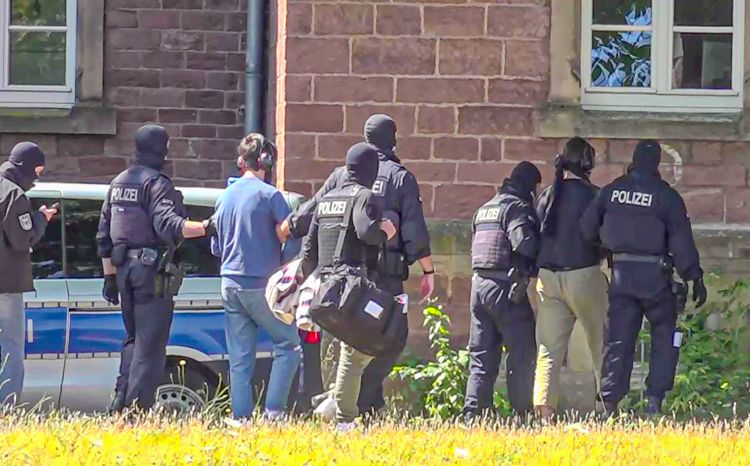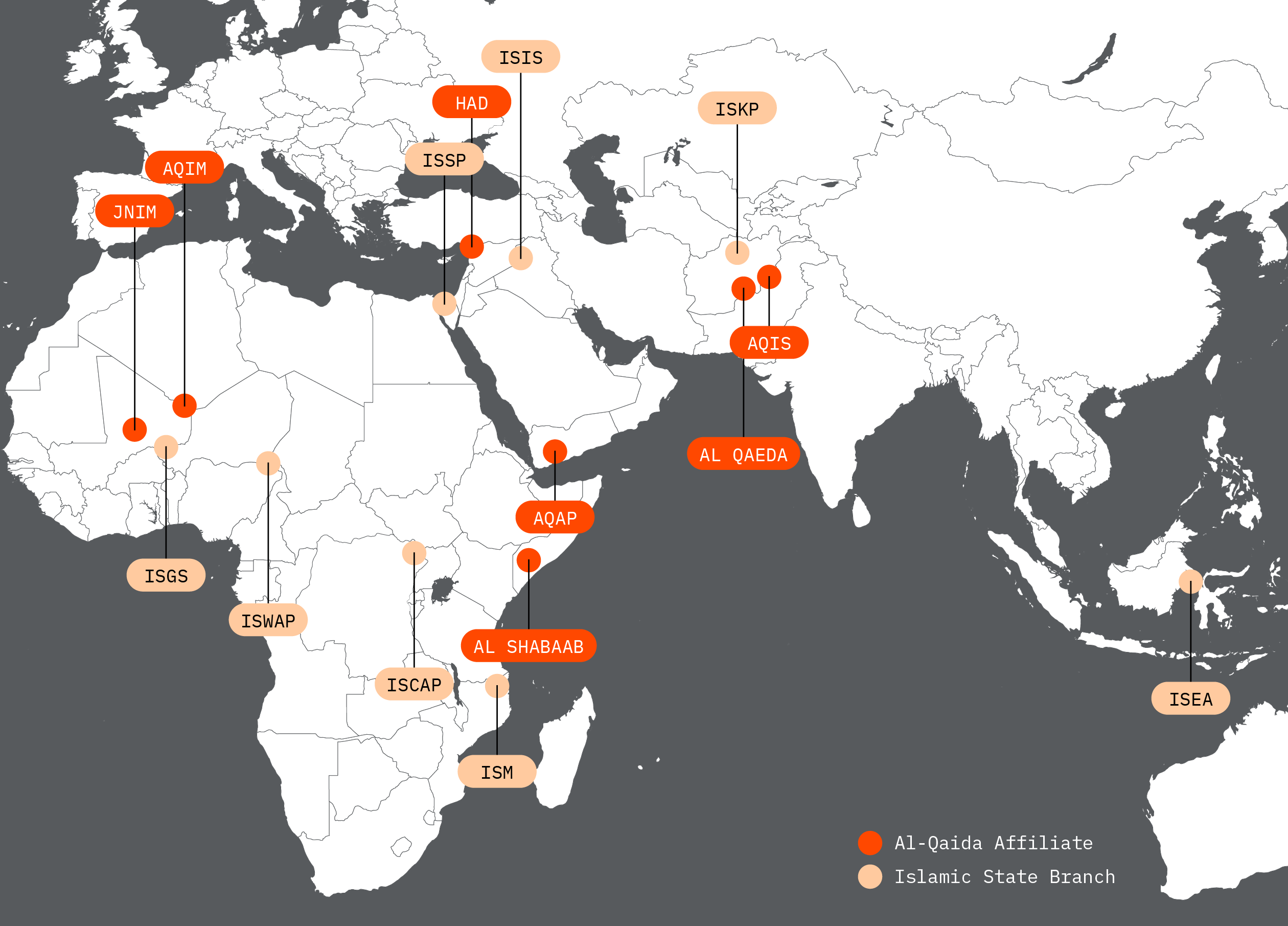7.1
The threat of terrorism in Europe
The threat of terrorism in Europe remains high in the near future, as two terrorist organisations – the Islamic State (IS) and al-Qaeda (AQ) – target European countries.
In 2023, Koran-burning demonstrations in Europe set the stage for retaliatory attacks.
Islamic terrorists are recruiting radicals for attacks from within the North Caucasian and Central Asian communities in Europe.
The threat of terrorism in Europe remains high in the near future. Against the backdrop of the Koran-burning demonstrations in 2023, Islamic radicals have successfully created an environment conducive to organising revenge attacks against Western countries and recruiting new members. European security is increasingly impacted by the growing capabilities of the Islamic State’s (IS) Afghanistan branch and al-Qaeda’s (AQ) North African branch to conduct operations in European countries.
The objective of IS and AQ is to carry out large-scale attacks in Europe comparable to the terror acts in Paris in 2015 and Brussels in 2016. Both AQ’s North African branch, known as Al-Qaeda in the Islamic Maghreb (AQIM), and the IS’s Khorasan Province branch in Afghanistan (ISKP) are seeking opportunities to organise such attacks using their existing support networks in Europe.
The spread of religious extremism into Europe is facilitated by a security vacuum in countries where governments lack control over part or most of their territory. In these regions, terrorists skilfully exploit endemic problems and ethnic conflicts, recruiting from vulnerable communities to enhance and expand their operations. The threat posed by such countries stems from the mix of religious extremism, international crime and terrorism.
European security in the coming years will be increasingly affected by instability in the Sahel region. In Mali, the armed forces, conducting counter-terrorism operations in collaboration with Russia, are unable to manage the security situation. Terrorists are increasing their capabilities and freedom of action, and Russia’s involvement in Mali is exacerbating regional problems. The security vacuum spreading from Mali, Burkina Faso and Niger to Western and Northern Africa has expanded AQIM’s opportunities to increase its influence in the region, which has become a breeding ground for terrorism, and to develop its network towards Europe.
In Afghanistan, the Taliban’s rise to power has led to the strengthening of ISKP. This IS branch’s capabilities and ambitions to conduct foreign operations and recruit members from outside Afghanistan have increased. In recent years, ISKP has successfully recruited radicals from Central Asian and North Caucasian communities in Europe to carry out attacks, although so far, these plans have only reached the preparation stage. In April and May 2020, Tajik nationals who had arrived in Europe as refugees were arrested in Germany, Poland and Albania for planning attacks under the guidance of IS members in Syria and Afghanistan. In November 2022, seven Tajiks and one Chechen planning an attack were arrested in France. In February 2023, a Russian citizen planning an attack against police officers was convicted in Germany; he intended to travel to Afghanistan and was in contact with a local ISKP member.

On 6 July 2023, a counter-terrorism operation led by security agencies in Germany, Belgium and the Netherlands resulted in the arrest of 9 members of an ISKP network, originating from Tajikistan, Turkmenistan and Kyrgyzstan, who were planning a terrorist attack in Germany.
Source: Waldemar Gess/EinsatzReport24/dpa
In a situation where European security agencies consistently prevent attacks by arresting Islamic radicals during the planning stages, Islamic terrorists are trying to recruit individuals not yet on these agencies’ radar. Terrorist organisations have begun to highlight Islamophobia in Western countries in their propaganda, inciting revenge for Koran burnings and mocking their Prophet.
IS and AQ propaganda channels and their branches around the world are spreading calls for revenge, urging terrorist attacks in Europe, as well as against Western embassies and Christians worldwide. ISKP, focusing on Russian-speaking Islamic radicals, including those from Central Asian and North Caucasian communities in Europe, is attempting to involve them in attacks outside Afghanistan, including in EU countries, Russia and Türkiye using Russian-language propaganda. ISKP has called for retaliatory attacks in response to the desecration of the Koran. Their targets include the Swedish and Dutch consulates in Istanbul, as well as churches and synagogues there. In Türkiye, some terrorists planning such attacks have been apprehended: on 4 February 2023, police arrested 18 Tajikistani and Uzbekistani citizens connected to IS who had travelled from Russia to Türkiye to attack the Swedish and Dutch consulates in Istanbul.

Various branches of Al-Qaeda and ISIS and their operating locations.
Terrorist organisations are exploiting the resentment within the Muslim community caused by incidents of Koran burnings.
Terrorist organisations are exploiting the resentment within the Muslim community caused by incidents of Koran burnings. They leverage this discontent to recruit radicals whom security agencies do not yet track for conducting operations against the West. In 2023, security agencies identified Hamas as a newly prominent threat following the discovery of its members planning an attack on German soil.
Despite the efforts of security agencies to prevent terrorism, thwarting attacks and capturing Islamic radicals in this context has become more challenging. In the coming years, the threat of Islamic terrorism will remain high, particularly in those European countries with substantial radical Islamic communities. Inspired by terrorist organisations or radical Islamic propaganda, members of these communities attempt to carry out attacks either alone or in small groups. Notably, a terrorist attack does not require extensive planning to achieve widespread coverage and impact, as evidenced by the deadly attacks carried out by lone Islamic radicals in Nice in 2016 and Stockholm in 2017.
Despite a persistently high level of terrorist threat in Europe, the threat level in Estonia remains low.
International terrorism does not pose a serious threat to Estonia but represents a high potential risk, especially for Estonian citizens abroad.